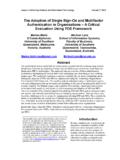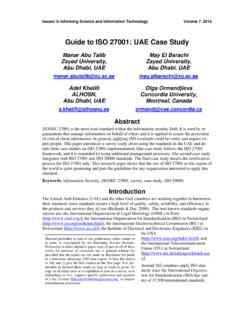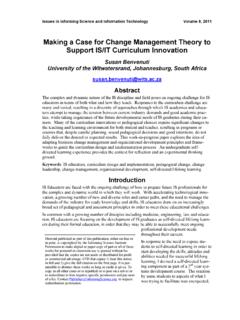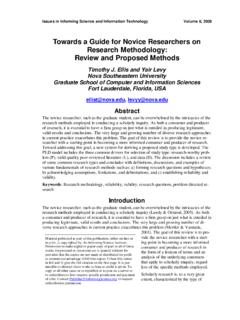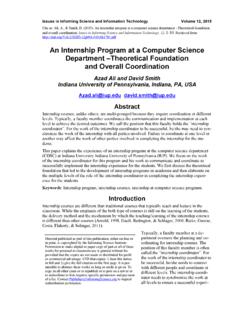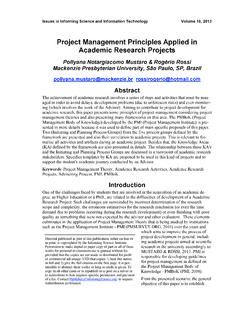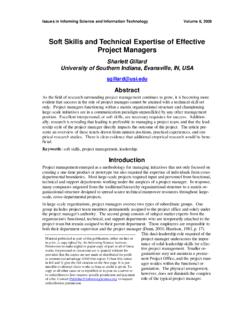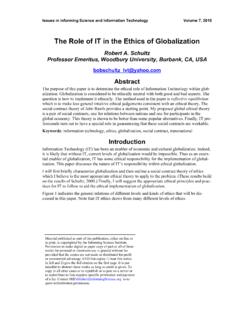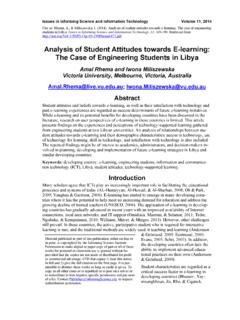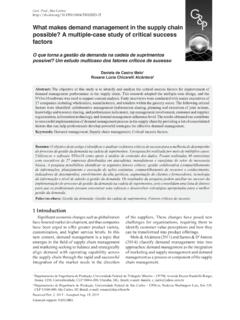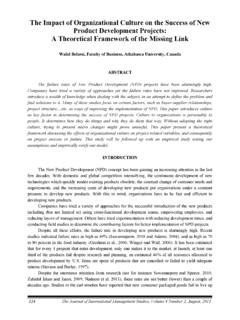Transcription of IT Teachers’ Experience of Teaching–Learning …
1 Issues in Informing Science and Information Technology Volume 12, 2015 Cite as: Bailey, R., & Mentz, E. (2015). IT teachers Experience of teaching learning strategies to promote critical thinking. Issues in Informing Science and Information Technology, 12, 141-152. Retrieved from IT Teachers Experience of teaching learning Strategies to Promote critical Thinking Roxanne Bailey and Elsa Mentz North-West University (Potchefstroom Campus), Potchefstroom, North West Province, South Africa Abstract Information Technology (IT) high school learners are constantly struggling to cope with the chal-lenges of succeeding in the subject. IT teachers, therefore, need to be empowered to utilize ap-propriate teaching learning strategies to improve IT learners success in the subject. By promot-ing critical thinking skills, IT learners have the opportunity to achieve greater success in the most difficult part of the curriculum, which is programming.
2 Participating IT teachers received once-off face-to-face professional development where some teachers received professional develop-ment in critical thinking strategies while other IT teachers received professional development in critical thinking strategies infused into pair programming. To determine how teachers Experience these suggested strategies, teachers participated in initial interviews as well as follow-up inter-views after they had implemented the suggested strategies. From the interviews, it became evi-dent that teachers felt that their learners benefited from the strategies. Teachers in the pair pro-gramming infusing critical thinking strategies focused more on the pair programming implemen-tation than on the totality of pair programming infused with critical thinking. Although teachers were initially willing to change their ways, they were not always willing to implement new teach-ing learning strategies.
3 Keywords: critical thinking, Information Technology education, Pair programming, teaching learning strategies, Programming. Introduction In the South African context, Information Technology (IT) is an elective subject that learners in high school can take in Grade 10 to 12. The subject is divided into five core areas of which soft-ware development (computer programming) makes up 60% (Department of Basic Education, 2012). Learners taking IT struggle mostly with the software development side of the subject, as computer programming is generally seen as a difficult task (Robins, Rountree, & Rountree, 2003). In the light of the main challenge being programming, it is important for IT teachers to shift their focus from teaching IT learners the memorization of programming syntax to equipping learn-ers with the necessary skills conducive to successful computer programming.
4 One suggested strategy for promoting computer programming skills is devel-oping critical thinking skills. Material published as part of this publication, either on-line or in print, is copyrighted by the Informing Science Institute. Permission to make digital or paper copy of part or all of these works for personal or classroom use is granted without fee provided that the copies are not made or distributed for profit or commercial advantage AND that copies 1) bear this notice in full and 2) give the full citation on the first page. It is per-missible to abstract these works so long as credit is given. To copy in all other cases or to republish or to post on a server or to redistribute to lists requires specific permission and payment of a fee. Contact request redistribution permission. IT Teachers Experience of teaching learning Strategies 142 critical thinking skills can be developed by implementing several teaching learning strategies of which deliberate critical thinking strategies as well as cooperative learning are only a few.
5 The research problem informing this article is the fact that the IT curriculum provides no specific teaching learning strategies although learners are expected to be developed into critical and crea-tive individuals who can successfully achieve the set objectives of the subject (Department of Basic Education, 2012). In the current study we attempted to empower IT teachers with teaching learning strategies that they can implement in order to promote critical thinking in their classes. The article reports on IT teachers Experience of the implementation of suggested critical thinking strategies in their classes by implementing a qualitative research design within an interpretivist research paradigm. A phenomenological research methodology was implemented as the research-ers main objective was to understand the IT teachers Experience .
6 Relevant Literature Defining critical Thinking critical thinking has its foundations in the work of philosophers like Socrates, Plato and Aristotle. Gutek (2009) notes that Socrates used questioning to facilitate learning in his students. During these sessions, his students were required to question, criticize and redevelop definitions (Gutek, 2009). Although Socrates was the master of Plato and Aristotle, these latter two philosophers also adapted strategies that served as pioneering work for critical thinking. Plato focused his teachings on getting students to distinguish between true and false claims (Leigh, 2007) whereas Aristotle emphasized the ability to identify different viewpoints (Halx & Reybold, 2005). In later years, Dewey (1910) developed his reflective thinking, which served as the first close definition of criti-cal thinking and critical thinking is often used interchangeably with the term reflective thinking.
7 In 1956, Benjamin Bloom and his colleagues formulated a taxonomy to illustrate the cognitive domain (Bloom, Engelhart, Furst, Hill, & Krathwohl, 1956). This taxonomy closely relates to critical thinking. According to Bloom et al. (1956), this taxonomy is used to set learning objec-tives for intellectual abilities and skills, which they continue to say is synonymous with critical thinking, reflective thinking or problem solving. More recently, several different views of critical thinking came to the fore in the body of scholar-ship (Bloom et al., 1956; Ennis, 1964; Glaser, 1941). The most cited definition of critical thinking and the one used in this study is that of Facione (1990). Facione (1990, p. 3) defines critical thinking as a purposeful, self-regulatory judgment that results in interpretation, analysis, evalua-tion, and inference, as well as explanation of the evidential, conceptual, methodological, criterio-logical, or contextual consideration upon which that judgment is based.
8 Importance of critical Thinking Hyslop-Margison (2003), Halpern (2003) and Tiwari, Lai, So, and Yuen (2006) emphasize the importance of critical thinking skills as it is seen as one of the most important skills to be success-ful in life. critical thinking skills contribute to educational goals and are pivotal in today s global-ized society as individuals are no longer required to know their place (figuratively speaking) but to determine their own position (Ten Dam & Volman, 2004). Apart from our globalized society, information is easily available, creating a window for untrustworthy information (Lorenzo & Dziuban, 2006). Learners therefore need to be equipped with the skills to evaluate and criticize information and to make judgments regarding such information. critical thinking development has been prescribed in several curricula around the world (Austral-ian Curriculum Assessment Authority, 2011; United Kingdom Department of Education, 2013).
9 In South Africa, this is no different, as is evident in the Strategic Plan for 2011 to 2014 where the Bailey & Mentz 143 Department of Education (2011) states that learners need to be prepared by schools to think criti-cally, as emphasized by Belluigi (2009) and Lombard and Grosser (2008). In IT, critical thinking skills hold several benefits. Sosu (2013) explains that critical thinking fo-cuses on problem solving where individuals are required to come up with solutions; therefore, critical thinking supports problem identification. Problem solving forms the basis of computer programming, and therefore it is not unexpected that Fagin, Harper, Baird, Hadfield, and Sward (2006) found that critical thinking supports computer programming. McMahon (2009) found that there is a statistical significant correlation between critical thinking skills and computer skills.
10 Developing critical Thinking Skills Development of critical thinking skills does not necessarily occur naturally and should therefore be practiced explicitly (Fisher, 2005). Although critical thinking should be developed explicitly, specific factors should be considered. Myers and Dyer (2004) determined that neither intellect nor gender plays a role in critical thinking development. Regarding whether critical thinking devel-opment should occur explicitly or be embedded in the curriculum, Marin and Halpern (2011) found that both approaches equally support the development of critical thinking skills. Apart from the factors to be considered when attempting to develop critical thinking skills, one of the most important factors during the development of critical thinking skills is the role of the facilitator. The facilitator needs to model critical thinking skills him/herself in order to inspire individuals to develop critical thinking (Snyder & Snyder, 2008; Van Gelder, 2001).
